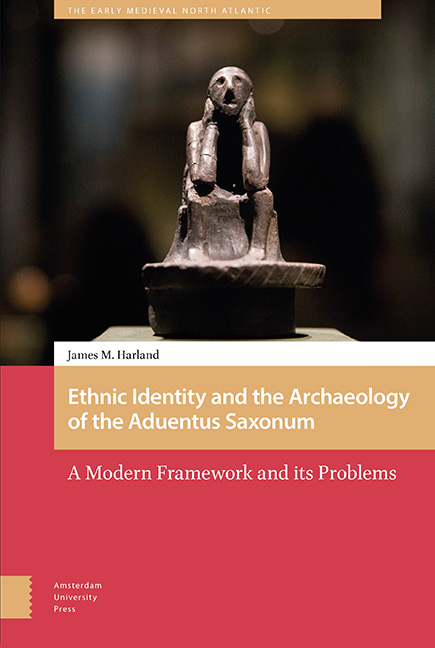Book contents
- Frontmatter
- Dedication
- Table of Contents
- List of Tables and Figures
- Acknowledgements
- 1 Introduction
- 2 Ethnicity and Archaeology
- 3 Empiricism and Metaphysics
- 4 Deconstructing Anglo-Saxon Archaeology
- 5 The Material Evidence Reconsidered
- 6 Building an Alternative
- 7 New Approaches and Final Reflections
- Appendix: Spong Hill Data
- Bibliography
- Index
4 - Deconstructing Anglo-Saxon Archaeology
Published online by Cambridge University Press: 16 December 2021
- Frontmatter
- Dedication
- Table of Contents
- List of Tables and Figures
- Acknowledgements
- 1 Introduction
- 2 Ethnicity and Archaeology
- 3 Empiricism and Metaphysics
- 4 Deconstructing Anglo-Saxon Archaeology
- 5 The Material Evidence Reconsidered
- 6 Building an Alternative
- 7 New Approaches and Final Reflections
- Appendix: Spong Hill Data
- Bibliography
- Index
Summary
Introduction
This chapter performs ‘deconstruction,’ in the proper sense of the word. That is, it burrows through the written messages, unstated implications, and hidden meanings produced by authors in archaeology to excavate the unintended aporiae contained in any truth claim they assert. Fundamental to this is addressing the notion that the material culture studied by their discipline expresses something intrinsically ‘Germanic’ in its use, or, indeed, ‘Anglian,’ ‘Jutish,’ ‘Saxon,’ or simply ‘Anglo-Saxon’. This claim, though lacking empirical basis, is continually drawn upon both as explanation for the recurrence of certain patterns of material culture in early medieval archaeology and justification for certain interpretations of its use. This chapter will deal not so much with the aforementioned empirical problems with this conceptual framework, but rather with the implicit textual problems inherent in its use, though these are themselves derived from the fundamentally non-empirical nature of the ‘Germanic’ construct. The chapter demonstrates that the types of terminology employed are frequently used uncritically, or with criticisms that are then forgotten or ignored in practice.
The chapter focuses upon crucial authors working in the field of early Anglo-Saxon archaeology who explore questions related to ethnicity and the aduentus Saxonum. The chapter does not study, or claim to represent, the entirety of recent early medieval archaeological output, but instead focuses on a select few authors whose arguments may be taken as foundational for the sorts of axiomatic ethnic assumptions that are present in other scholarly works. The methodological approach was outlined in the previous chapter, drawing explicitly upon a Derridean philosophical framework to outline the points at which the author has ceased to demonstrate something through empiricism, and instead makes an interpretative leap of judgement. Substantial space is dedicated to the works of John Hines, for the reason that he is the scholar to whom those that continue to defend ethnic interpretations of material culture most frequently make reference. We will also see that much of his argumentation lends itself to deconstructive readings. Catherine Hills and Sam Lucy are also discussed at length; the former due to her centrality to debates over migration and her frequent critical interventions in questions of ethnic interpretation, the latter because her work is that most explicitly dedicated to grappling with the problems with ethnic narratives.
- Type
- Chapter
- Information
- Ethnic Identity and the Archaeology of the aduentus SaxonumA Modern Framework and its Problems, pp. 115 - 158Publisher: Amsterdam University PressPrint publication year: 2021



